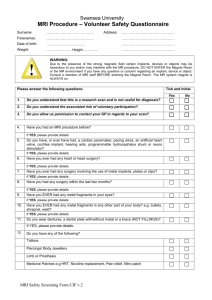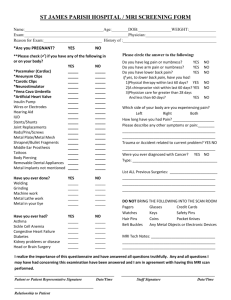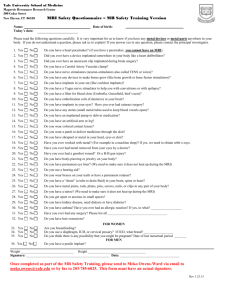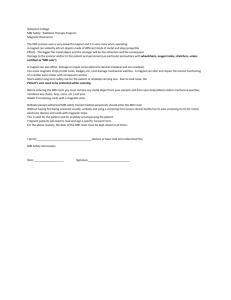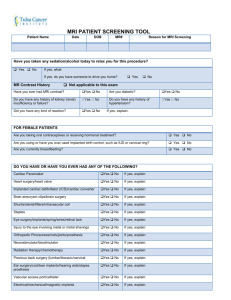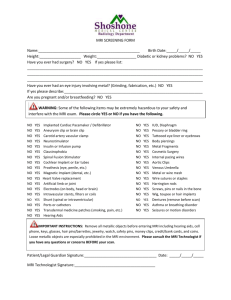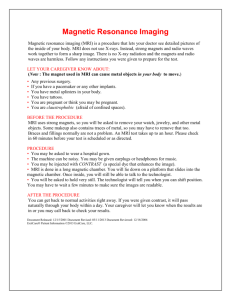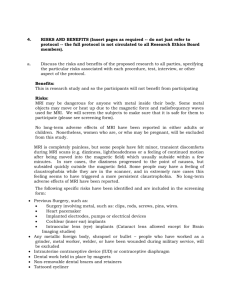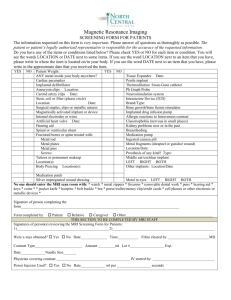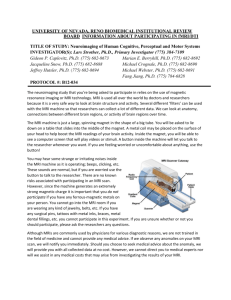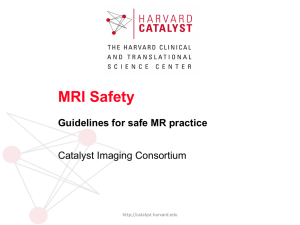385-8620 Magnetic Resonance Imaging Contraindication Screening
advertisement
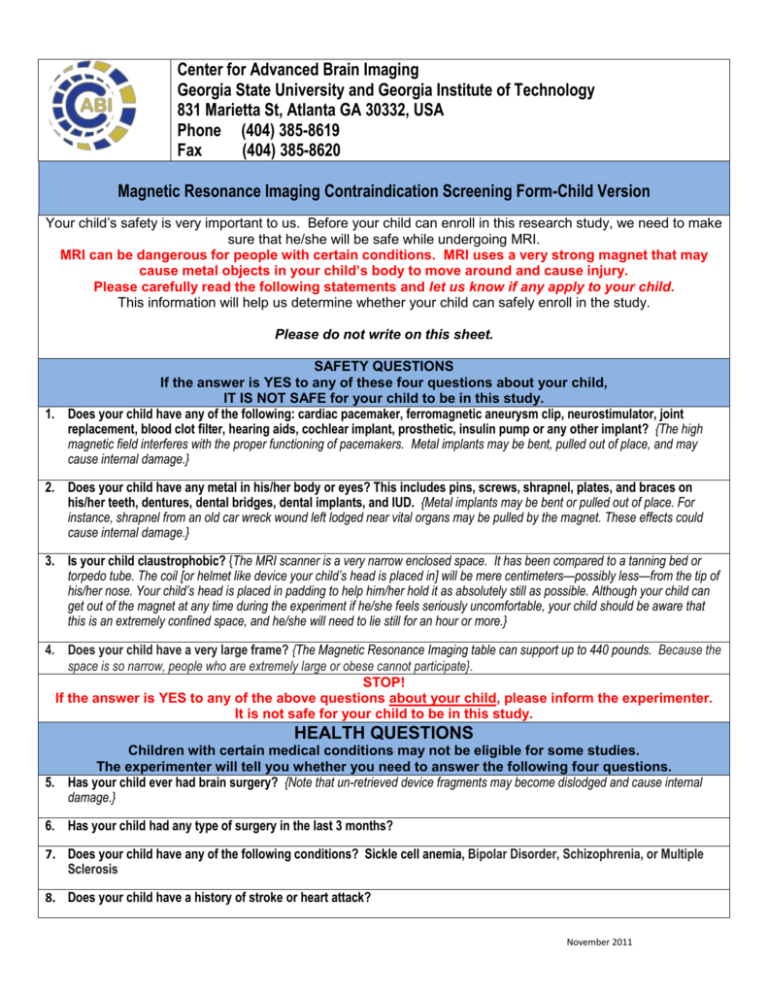
Center for Advanced Brain Imaging
Georgia State University and Georgia Institute of Technology
831 Marietta St, Atlanta GA 30332, USA
Phone (404) 385-8619
Fax
(404) 385-8620
Magnetic Resonance Imaging Contraindication Screening Form-Child Version
Your child’s safety is very important to us. Before your child can enroll in this research study, we need to make
sure that he/she will be safe while undergoing MRI.
MRI can be dangerous for people with certain conditions. MRI uses a very strong magnet that may
cause metal objects in your child’s body to move around and cause injury.
Please carefully read the following statements and let us know if any apply to your child.
This information will help us determine whether your child can safely enroll in the study.
Please do not write on this sheet.
SAFETY QUESTIONS
If the answer is YES to any of these four questions about your child,
IT IS NOT SAFE for your child to be in this study.
1. Does your child have any of the following: cardiac pacemaker, ferromagnetic aneurysm clip, neurostimulator, joint
replacement, blood clot filter, hearing aids, cochlear implant, prosthetic, insulin pump or any other implant? {The high
magnetic field interferes with the proper functioning of pacemakers. Metal implants may be bent, pulled out of place, and may
cause internal damage.}
2. Does your child have any metal in his/her body or eyes? This includes pins, screws, shrapnel, plates, and braces on
his/her teeth, dentures, dental bridges, dental implants, and IUD. {Metal implants may be bent or pulled out of place. For
instance, shrapnel from an old car wreck wound left lodged near vital organs may be pulled by the magnet. These effects could
cause internal damage.}
3. Is your child claustrophobic? {The MRI scanner is a very narrow enclosed space. It has been compared to a tanning bed or
torpedo tube. The coil [or helmet like device your child’s head is placed in] will be mere centimeters—possibly less—from the tip of
his/her nose. Your child’s head is placed in padding to help him/her hold it as absolutely still as possible. Although your child can
get out of the magnet at any time during the experiment if he/she feels seriously uncomfortable, your child should be aware that
this is an extremely confined space, and he/she will need to lie still for an hour or more.}
4. Does your child have a very large frame? {The Magnetic Resonance Imaging table can support up to 440 pounds. Because the
space is so narrow, people who are extremely large or obese cannot participate}.
STOP!
If the answer is YES to any of the above questions about your child, please inform the experimenter.
It is not safe for your child to be in this study.
HEALTH QUESTIONS
Children with certain medical conditions may not be eligible for some studies.
The experimenter will tell you whether you need to answer the following four questions.
5. Has your child ever had brain surgery? {Note that un-retrieved device fragments may become dislodged and cause internal
damage.}
6. Has your child had any type of surgery in the last 3 months?
7. Does your child have any of the following conditions? Sickle cell anemia, Bipolar Disorder, Schizophrenia, or Multiple
Sclerosis
8. Does your child have a history of stroke or heart attack?
November 2011
Page 2
If the answer is YES to any of the following questions about your child,
IT MAY NOT BE SAFE for your child to be in this study.
You will need to discuss these points with the experimenter.
Do not write on this sheet.
1. Does your child wear a medicated adhesive patch? {Medicated adhesive patches with metal backing may heat up and
burn the skin during MRI. If so, the experimenter may ask whether the patch can be removed during MRI.}
2. Does your child have any non-removable jewelry, facial piercing, or permanent makeup? {Permanent makeup and
metal jewelry made out of materials like surgical steel may heat up and become uncomfortably warm.}
3. Does your child have any tattoos? {Some tattoo dyes contain metal fragments that may heat up and become
uncomfortably warm or cause swelling.}
4. Does your child have now (or ever had) any of the following? ADD/ADHD or any other neurological or psychological
disorder?
5. Does your child have now (or ever had) any of the following? Epilepsy, a seizure, loss of consciousness for more
than a few seconds, or brain damage? {If so, the completion of a special seizure protocol by your child’s doctor may be
required before your child can be in this study.}
6. Has your child ever been seen by a neurologist, psychiatrist or psychologist (not counselor)?
7. Does your child take tranquilizers, sleeping pills, anxiety or depression medication, or other psychological
medications?
8. Does your child have now (or ever had) any of the following? Heart disease, anemia, untreated diabetes, or untreated
high or low blood pressure?
9. Does your child use recreational drugs?
10. Has your child ever used or abused alcohol?
11. Does your child have now (or ever had) untreated respiratory problems (e.g., severe asthma, emphysema)?
12. Does your child have now (or ever had) any of the following vision conditions? Untreated cataracts, untreated
glaucoma or macular degeneration?
13. Does your child need glasses and cannot wear contact lenses? {Most studies require responses to visual cues or
instructions, so normal vision is usually required. In these studies, contact lens corrected vision is considered the same as
normal vision}.
14. Does your child have any hearing difficulties? {If so, you might be asked about his/her hearing in each ear.}
15. Does your child have any orthopedic issues such as arthritis or back pain that would make it difficult for him/her to
sit or lie still for at least an hour or to use a keyboard?
16. Does your child have any other physical or mental problems that you haven’t mentioned so far?
THE RISKS TO FETUSES FROM EXPOSURE TO MRI ARE CURRENTLY UNKNOWN.
IF YOU BELIEVE THERE IS A CHANCE THAT YOUR CHILD IS PREGNANT,
PLEASE CONSIDER THIS WARNING CAREFULLY.
Your child’s safe is very important to us.
Please tell the experimenter about any safety concerns that you may have.
Thank you for your interest.
November 2011
